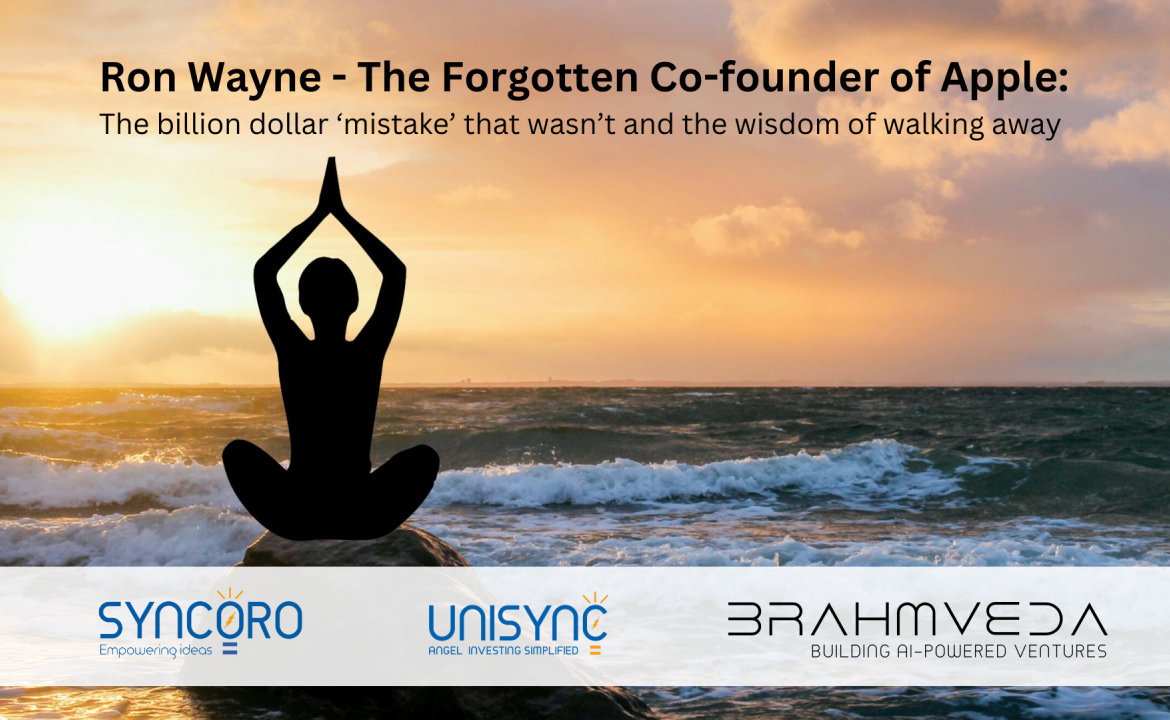Ron Wayne – The Forgotten Co-founder of Apple: The billion dollar ‘mistake’ that wasn’t and the wisdom of walking away
In the annals of business history, few stories capture the imagination and provoke debate as much as that of Ron Wayne, the often-overlooked third co-founder of Apple Computers. His decision to sell his 10% stake in the nascent company for a mere $800 in 1976, and later accept an additional $1,500 to forfeit any future claims, is frequently cited as one of the costliest mistakes in the history of business. Today, that stake would be worth billions of dollars. However, to label Wayne’s decision simply as a mistake is to overlook the nuances and complexities of the situation. His story offers profound lessons for entrepreneurs and business leaders alike.
The Context of Wayne’s Decision
Ron Wayne was brought into Apple by Steve Jobs and Steve Wozniak to provide adult supervision and a measure of experience. At 42, Wayne was considerably older than the other two founders, who were both in their early twenties. He had a steady job at Atari and had previously started his own company, which had failed. This failure left him financially cautious and risk-averse. When Apple was founded, it was little more than a fledgling garage operation. Jobs and Wozniak had grand visions, but Wayne, with his experience, foresaw the financial and personal risks. Within a short span, he decided to relinquish his stake. Wayne’s move was driven by his fear of financial ruin, a rational concern given that the venture required substantial investment and held no guarantee of success.
Was It a Mistake?
In hindsight, it’s easy to judge Wayne’s decision harshly. The meteoric rise of Apple, leading to it becoming one of the most valuable companies in the world, makes Wayne’s exit seem like a monumental error. Yet, evaluating his choice requires empathy and an understanding of his personal circumstances. For Wayne, the decision was about self-preservation and maintaining his financial stability. Had Apple failed, the debts incurred could have been catastrophic for him. While Jobs and Wozniak were willing to take monumental risks, Wayne’s temperament and life situation made such risks untenable. His departure allowed him to avoid potential financial disaster and maintain a stable life.
Impact on Apple’s Growth
Wayne’s departure arguably benefitted Apple as well. The dynamic duo of Jobs and Wozniak complemented each other perfectly. Jobs was the visionary and master marketer, while Wozniak was the technical genius. Their synergy was crucial to Apple’s early success. Wayne’s more conservative and risk-averse nature might have hindered the bold, sometimes reckless, decisions that Jobs made, which were essential to Apple’s breakthrough innovations.
Lessons for Entrepreneurs
Ron Wayne’s story is a powerful narrative with multiple takeaways for startup founders, and it resonates deeply with the wisdom found in the Vedas and Upanishads:
- Risk Tolerance Varies: Every individual has a different capacity for risk. Wayne’s decision highlights the importance of self-awareness and knowing one’s limits. This aligns with the Vedic principle of Swadharma, understanding and adhering to one’s own duty and nature.
- Long-term Vision: Jobs and Wozniak had a long-term vision for Apple, something that Wayne struggled to see due to his immediate concerns. The Upanishads teach the value of Shraddha (faith) and Titiksha (perseverance), which are essential for seeing beyond immediate challenges and focusing on the ultimate goal.
- Complementary Skills: The success of Jobs and Wozniak underscores the importance of complementary skills in a founding team. The Vedas emphasize the concept of Sahakarita (cooperation), where different skills and talents come together harmoniously to achieve greater success.
- The Value of Stability: For Wayne, stability and peace of mind were more valuable than potential wealth. The Upanishads advocate for a balanced life, stressing the importance of Santosha (contentment) and Ananda (inner joy), which come from living in alignment with one’s true self rather than chasing external wealth.
- No Regrets: Despite missing out on billions, Wayne has often expressed that he has no regrets. This attitude mirrors the teaching of the Bhagavad Gita: to act without attachment to the results. As Krishna advises Arjuna, one should perform their duties and make decisions based on righteousness, not solely on the potential outcomes.
Conclusion
Ron Wayne’s exit from Apple is not merely a tale of missed financial opportunity but a profound story about understanding oneself and making choices that align with one’s values and circumstances. It reminds entrepreneurs that while the allure of massive success is tempting, it’s equally important to remain true to one’s principles and comfort levels. Wayne’s decision may seem like a mistake in financial terms, but it was a choice that suited his life. For startup founders, his story is a valuable reminder that success comes in many forms, and sometimes, the greatest success is living a life free from regret and full of personal contentment. This echoes the timeless wisdom of the Vedas and Upanishads: true success lies not in material wealth, but in inner peace and the realisation of one’s Dharma. Every decision, even one that seems like a mistake in financial terms, can lead to profound personal fulfilment if it is made in harmony with one’s inner values and principles.
#startup #accelerator #syncoro #unisyncangels #brahmveda

